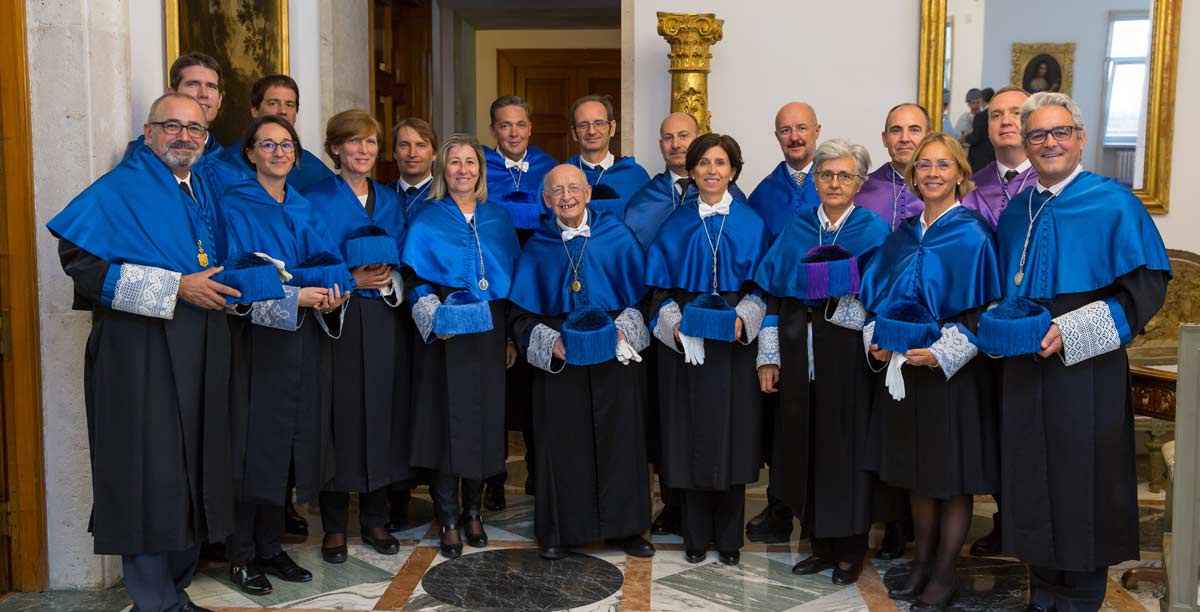Professor Francisco Ponz, President of the University of Navarra from 1966 to 1979, passed away.
Alfonso Sánchez-Tabernero, President: "He dedicated his entire life to promoting this University with all his intellectual knowledge. He leaves an indelible mark".

FotoManuel Castells/<br>Francisco Ponz (en el centro) junto a doctores de la Facultad de Ciencias en la apertura de curso 2019-2020.
Professor Francisco Ponz Piedrafita, third President of the University of Navarra, has died at the age of 101. Ponz died near the cornerstone of Central Building, while waiting for a colleague to go to the funeral of Full Professor Antonio Monge, a friend of his. Francisco Ponz was Professor of Physiology at the University's School of Sciences and President for 13 years, between 1966 and 1979. He then continued for another thirteen years as Vice President, until 1992.
During this time, the University of Navarra experienced great growth. The institutes of Theology and Information Sciences became Schools, and the ILCE(Institute of language andSpanish Culture) was born. In 1967, professors from six of the world's great universities accepted honorary doctorates from the University of Navarra, which signified its international takeoff. Ponz remembered that moment as the happiest of his time in office. In addition, during his years as President the Sciences Building, the library (now Ismael Sánchez Bella Building) and the School of Architecture were built. During his time as Vice President the School of Economics, the research center Ceit of San Sebastian and the CIFA (research center in Applied Pharmacobiology) were created.
"Don Francisco Ponz was a great President because above all he understood what St. Josemaría Escrivá wanted this university to be: a place with a Christian identity, open to the whole world, which should have an impact on the students, on the people who work here and then on the whole world through research," said Alfonso Sánchez-Tabernero, the university's President . "I find it revealing that he passed away next to the foundation stone of Central Building. He dedicated almost his entire life to promoting this University, with great success, with all his intellectual knowledge and with all the passion of his heart. He was a person with project, hope, eagerness to serve, who leaves an indelible mark on the University."
Francisco Ponz combined his governmental work at the University with various positions in scientific institutions. During his career, dedicated to Animal Physiology, he published about 170 papers in Spanish and foreign journals. Some thirty Ph.D. students were under his direction to write their thesis . Professor Ponz was in charge of the Revista Española de Fisiología - since 1995 renamed Journal of Physiology and Biochemistry - of which he was co-founder (1945) and director.
His awards include the Grand Cross of Alfonso X Wise. And the Gold Medal of the University of Navarra, imposed in 1991 by the Chancellor Monsignor Álvaro del Portillo, awarded for his submission and service to the academic center.
A life dedicated to Science
Francisco Ponz was born in Huesca in 1919. After fill in in high school diplomain 1935 he moved to Madrid to do the programs of study of the licentiate degree in Natural Sciences, which he finished in 1941. He worked at the high school Cajal of the committee Superior de Investigaciones Científicas (CSIC) and in 1942 he received his PhD in Natural Sciences from the Complutense University.
From the first moment he was oriented towards Physiology, without neglecting his relations with Morphology and Molecular Biology. In 1942 he received a grant from the CSIC to carry out research in Switzerland at different university centers, first in Zürich and then in Fribourg.
On May 11, 1944 he obtained, unanimously, the Chair of Organography and Animal Physiology of the School of Sciences of the University of Barcelona, where he remained from 1944 to 1966. Years later, when the licentiate degree in Natural Sciences was divided into two branches, Biological Sciences and Geological Sciences, his subject was renamed Animal Physiology. From the 1954-1955 academic year and by virtue of the reform of the curricula of the licentiate degree, he was entrusted with the teaching of General Physiology. From 1948 to 1966 he taught the Enzymology course for the mandatory courses of doctorate.
